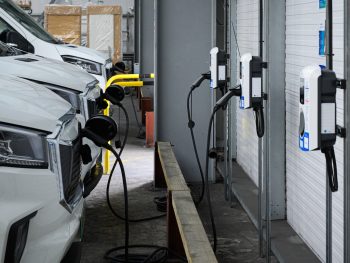More support is needed for operators to go electric if the logistics sector is to decarbonise effectively, in line with the Government’s 2050 net zero deadline.

The call comes from business group Logistics UK whose newly published Electric Vehicle Report 2023 finds that factors including a lack of fiscal support and an inadequate public charging network are having a significant impact on the confidence of operators to invest in battery electric vehicles (BEVs).
In 2022, EVs represented 0.9% of the UK’s van fleet, up from 0.3% in 2019. And while the majority of the businesses surveyed for the report – 62% – plan to have decarbonised their van fleets by 2030, significant barriers remain that prevent the uptake needed ahead of the deadlines.
David Wells, chief executive of Logistics UK, said: “The logistics sector is fully aware of its responsibilities to decarbonise and is keen to do so. However, with respondents reporting wide ranging costs to upgrade their energy supplies to depots – between £100,000 and over £1 million – a lack of meaningful scrappage schemes, acquisition costs on the rise and volatile energy prices, it is an uphill battle that cannot continue without increased support from government.
“Our industry operates on very narrow margins of around 1% and with significant inflationary pressures, increased wage bills and the rise in total road vehicle operating costs, logistics businesses need supportive fiscal measures to be able to upgrade their fleets and energy supplies without having to pass on increased costs to customers.”
With all respondents citing energy supply as their top priority, the business group is also calling for a fair and equitable approach to funding depot electricity connection.
Wells continued: “Significant frustration was expressed by our members who regularly use current public charge points, with respondents reporting difficulties in finding available EV charge point spaces and many encountering broken or inoperable chargers.
“With further issues surrounding the suitability of existing charging facilities for commercial vehicles, Logistics UK is calling for an EV charging and refuelling infrastructure roadmap to be prioritised. This must be designed in collaboration with operators, backed with clear guidance and incentives for local authorities. A significantly accelerated rollout of public charging infrastructure that is fully accessible to commercial vehicles, with clear milestones for minimum levels of suitable charge point provision across the country, must be an urgent priority for government if our industry is to meet its net zero priorities by 2050.”
The cost and availability of new electric vehicles is also a concern for the logistics sector, with long order deadlines and no viable scrappage schemes putting heavy cost burdens on businesses, particularly SMEs.
“The lifecycle of a vehicle is carefully worked into any logistics business’ budget, to ensure continuity while keeping costs down. Our members should not be expected simply to write off the cost of any vehicles they operate – which could run to thousands of pounds for every operator: a supportive scrappage scheme should be in place to ensure that logistics businesses can stay on the roads without incurring further, punitive costs,” Wells added.
Last week saw the BVRLA warn that an ‘Electric Van Plan’ was needed after the Office for Zero Emissions increased the limit on Plug-in Van Grant (PiVG) orders, from 1,000 per end customer, per financial year to 1,500, with immediate effect.
The BVRLA said the increased limit was a positive step but was also indicative of the challenges being faced by van operators when looking to move away from diesel – and it’s called for action to address these.
Gerry Keaney, chief executive, said: “The ZEV mandate that comes into force next year will encourage manufacturers to produce more affordable and capable electric vans. In the meantime, we need to see a huge effort in rolling out a more affordable, reliable and accessible van fleet-friendly charging infrastructure. We need a new Electric Van Plan.”
The Society of Motor Manufacturers and Traders (SMMT) has also previously called for a Van Plan after its research found 57% of van owners were anxious about going electric over fears they won’t be able to find a charging point when they need it.
Latest SMMT data on new van registrations show BEV uptake soared in April, up 62.6% to 1,494 units, giving a market share of 6.6%. But the trade body has downgraded its 2023 BEV market share forecast – from 8.6% to 7.4% – against the challenging economic backdrop as it warned that high energy costs, limited incentives and inflationary pressures mean that the important total cost of ownership calculations are often negative.
Logistics UK’s Electric Vehicle Report is available here.

